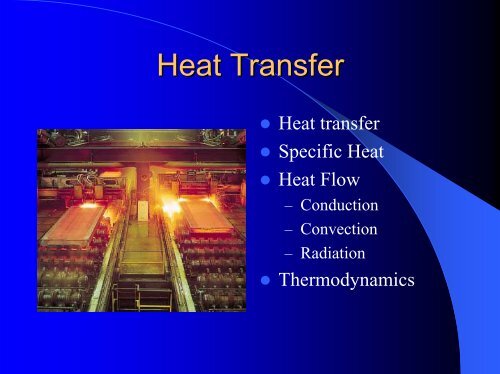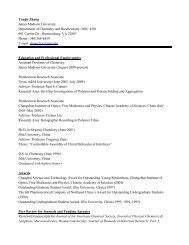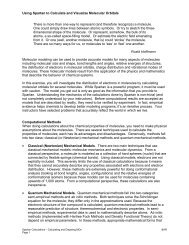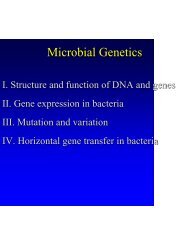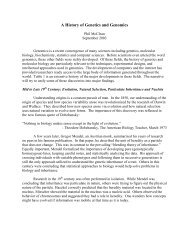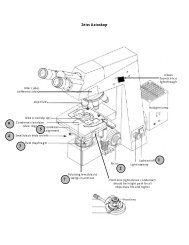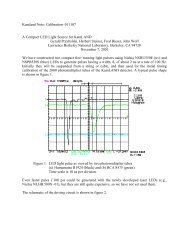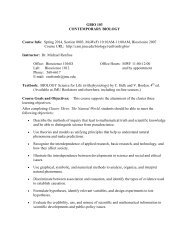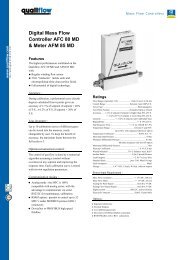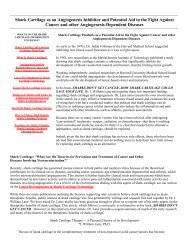Heat Transfer
Heat Transfer
Heat Transfer
You also want an ePaper? Increase the reach of your titles
YUMPU automatically turns print PDFs into web optimized ePapers that Google loves.
<strong>Heat</strong> <strong>Transfer</strong><br />
! <strong>Heat</strong> transfer<br />
! Specific <strong>Heat</strong><br />
! <strong>Heat</strong> Flow<br />
– Conduction<br />
– Convection<br />
– Radiation<br />
! Thermodynamics
Phases of Mater
Phases of Matter<br />
! Solids :<br />
– Have definite volume<br />
– occupy definite space<br />
– strong cohesive forces<br />
! Liquids :<br />
– Have volume<br />
– Cohesive forces are intermediate in strength<br />
! Gases :<br />
– Cohesive forces are the weakest<br />
– Molecules are free to move about in space
Measures of <strong>Heat</strong><br />
! <strong>Heat</strong> is a form of energy<br />
! UNITS : Joule (SI System)<br />
! Simpler everyday unit : calorie<br />
! Conversion<br />
– 4.184 J = 1 Cal
<strong>Heat</strong> transfer<br />
Internal Energy<br />
Kinetic Energy<br />
HEATING
<strong>Heat</strong><br />
! <strong>Heat</strong> " Energy<br />
! Can be absorbed or liberated<br />
! HEAT LOST = HEAT GAINED
Specific <strong>Heat</strong><br />
! <strong>Heat</strong> Energy Q = m c ∆T<br />
! c = specific heat capacity<br />
! Units : J/(kg-K) or cal / (g-C)<br />
! Water " c = 1 cal/g-C
Method of Mixtures<br />
! Hot object + Cold object<br />
<strong>Heat</strong> Lost<br />
T c<br />
<strong>Heat</strong> Gained<br />
T h<br />
(m c ∆T ) lost = (m c ∆T) gained<br />
! Energy is conserved
Specific <strong>Heat</strong><br />
! A coffee cup having a mass of 500 g is made of<br />
silver and is at an initial temperature of 20° C.<br />
! Hot coffee at 90 ° C is poured into the cup, and the<br />
final temperature of the coffee cup is 70 ° C<br />
! How much coffee is poured into the cup?<br />
! (Specific heat capacity of silver is 0.056 cal/g-C<br />
and that of coffee is 0.98 cal/g-C)
Specific <strong>Heat</strong><br />
<strong>Heat</strong> Gained by Cup = <strong>Heat</strong> Lost by Coffee<br />
m<br />
cup<br />
c<br />
cup<br />
( mc∆T<br />
) ( ) cup<br />
= mc∆T<br />
coffee<br />
( T ) ( )<br />
f<br />
−Ti<br />
= m<br />
cup coffeeccoffee<br />
Tf<br />
−Ti<br />
coffee<br />
( ) ( ) ( ) ( )<br />
cal o o<br />
cal o o<br />
0.056 o × 70 C − 20 C = mcoffee<br />
× 0.98 × 70 C 90 C coffee<br />
500g<br />
×<br />
−<br />
g<br />
C<br />
cup<br />
g<br />
o<br />
C<br />
1400 cal = ×19. 6<br />
m coffee<br />
cal<br />
g<br />
∴m<br />
1400cal<br />
=<br />
19.6<br />
=<br />
71. 4<br />
coffee cal<br />
g<br />
g
Conduction<br />
! <strong>Heat</strong> transfer<br />
! Molecular interaction<br />
molecular motion<br />
Cold<br />
<strong>Heat</strong><br />
Conductors and Insulators
Convection<br />
! Large scale molecular migration with high<br />
kinetic energy<br />
! Happens in liquids and gases<br />
! Molecules have more freedom for<br />
movement<br />
! Warm, less dense gas moves upward<br />
! Cooler, more dense gas moves downward<br />
! Convection currents
Radiation<br />
! Energy transfer without any medium of<br />
transfer<br />
! <strong>Heat</strong>ing effects of light radiation from sun<br />
! Radiation is electromagnetic in nature<br />
! Infra-red lamps<br />
! Ultra-violet radiation<br />
! Gamma radiations, X-ray


